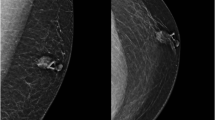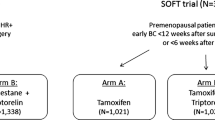Abstract
The occurrence of breast cancer in men is rare in comparison to women. Public knowledge that men can get breast cancer and of male breast self-examination are lacking. Research in the course and treatment of breast cancer in men is needed. Men generally present in more advanced stages of breast cancer than women, and have a poorer prognosis. In this article, the epidemiology, common symptoms, diagnostic methods, and current treatment of breast cancer in men are described. Gender differences in presentation and course of illness are discussed. Additionally, the psychological implications of breast cancer for male gender roles and masculine identity are explored. Directions for further investigation are given. Treatment providers are encouraged to educate themselves and their male patients on breast cancer in men and male breast examination techniques so that this disease may be identified earlier in its course and survival rates improved.
Similar content being viewed by others
REFERENCES
Amir, H., Makwaya, C. K., Moshiro, C., & Kwesigabo, G. (1996). Carcinoma of the male breast:Asexually transmitted disease? East African Medical Journal, 73(3), 187-190.
Appelbaum, A. H., Evans, G. F., Levy, K. R., Amirkhan, R. H., & Schumpert, T. D. (1999). Mammographic appearances of male breast disease. Radiographics, 19, 559-568.
Borgen, P. I., Wong, G. Y., Vlamis, V., Potter, C., Hoffman, B., Kinne, D. W., Osborne, M. P., & McKinnon, W. M. (1992). Current management of male breast cancer: A review of 104 cases. Annals of Surgery, 215(5), 451-459.
Butler, L., Koopman, C., Classen, C., & Spiegel, D. (1999). Traumatic stress, life events, and emotional support in women with metastatic breast cancer: Cancer-related traumatic stress symptoms associated with past and current stressors. Health Psychology, 18(6), 555-560.
Cocco, P., Figgs, L., Dosemeci, M., Hayes, R., Linet, M. S., & Hsing, A. W. (1998). Occupational exposures and male breast cancer. Occupational Environmental Medicine, 55(9), 599-604.
Cooper, C. L., & Faragher, E. B. (1993). Psychosocial stress and breast cancer: The interrelationship between stress events, coping strategies and personality. Psychological Medicine, 23(3), 653-662.
Coreil, J., & Behal, R. (1999). Man to man prostate cancer support groups. Cancer Practicioner, 7, 122-129.
Crichlow, R.W., & Galt, S. W. (1990). Male breast cancer. Surgical Clinics of North America, 70, 1165-1177.
Donegan, W. L., & Redlich, P. N. (1996). Breast cancer in men. Surgical Clinics of North America, 76(2), 343-363.
Everson, R. B., & Lippman, M. E. (1979). Male breast cancer. In W. L. McGuire (Ed.), Breast Cancer, Volume 3.New York: Plenum Press.
Fullerton, J. T., Lantz, J., & Sadler, G. R. (1997). Breast cancer among men: Raising awareness for primary prevention. Journal of Academic Nurse Practitioners, 9(5), 211-216.
Goss, P. E., Reid, C., Pintile, M., Lim, R., & Miller, N. (1999). Male breast carcinoma: A review of 229 patients who presented to the Princess Margaret Hospital during 40 years. Cancer, 85, 629-639.
Hecht, J. R., & Winchester, D. J. (1994). Male breast cancer. American Journal of Clinical Pathology, 102S25-S30.
Helgeson, V. S., & Cohen, S. (1996). Social support and adjustment to cancer: Reconciling descriptive, correlational and intervention research. Health Psychology, 15, 135-148.
Hill, A., Yagmur, Y., Tran, K. N., Bolton, J. S., Robson, M., & Borgen, P. I. (1999). Localized male breast carcinoma and family history. An analysis of 142 patients. Cancer, 86821-825.
Ihezue, C. H., Ojukwu, J. O., & Nbonu, O. O. (1992). Male breast cancer in Nigeria: A 13 year study. West African Journal of Medicine, 11(3), 203-210.
Jaiyesimi, I. A., Buzdar, A. U., Sahin, A. A., & Ross, M. A. (1992). Carcinoma of the male breast. Annals of Internal Medicine, 117(9), 771-777.
Joshi, A., Kapila, K., & Verma, K. (1999). Fine needle aspiration cytology in the management of male breast masses. Acta Cytologia, 43(3), 334-338.
Joshi, M. G., Lee, A. K., Loda, M., Camus, M. G., Pedersen, C., Heatley, G. J.,& Hughes, K. S. (1996). Male breast carcinoma: An evaluation of prognostic factors contributing to a poorer outcome. Cancer, 77, 490-498.
Landis, S. H., Murray, T., Bolden, S., & Wingo, P. A. (1999). Current statistics, 1999. CA—A Cancer Journal for Clinicians, 49, 8-31.
Lepore, S. J. (1998). Problems and prospects for the social support reactivity hypothesis. Annals of Behavioral Medicine, 20(4), 257-269.
Lowy, D. R., Kimbauer, R., & Schiller, J. T. (1994). Genital human papilloma virus infections. Proceedings of the National Academy of Sciences of the USA, 91, 2436-2440.
Mabuchi, K., Bross, D. S., & Kessler, I. I. (1985). Risk factors for male breast cancer. Journal of the National Cancer Institute 74, 371-375.
McLachlan, S. A., Erlichman, C., Liu, F. F., Miller, N., & Pintilie, M. (1996). Male breast cancer: An 11 year review of 66 patients. Breast Cancer Research and Treatment, 40(3), 225-230.
Nicholas, D. (1999). Men, masculinity and psychosocial adjustment to cancer. Society for the Psychological Study of Men and Masculinity Bulletin, 4(4), 5-8.
Parkin, D. M., & Ngendahayo, P. (1986). Cancer in Rwanda. Study of relative frequency. Bulletin Cancer, 73(2), 155-164.
Ravandi, K., & Hayes, T. G. (1998). Male breast cancer: A review of the literature. European Journal of Cancer, 34(9), 1341-1347.
Rayson, D., Erlichman, C., Suman, V. J., Roche, P. C., Wold, L. E., & Ingle, J. N. (1998). Molecular markers in male breast carcinoma. Cancer, 83, 1947-1955.
Rowland, J. H., & Holland, J. C. (1990). Breast Cancer. In J. C. Holland, & J. H. Rowland (Eds), Handbook of Psychooncology: Psychological care of the patient with cancer(pp. 188-207). New York: Oxford University Press.
Rudan, I., Rudan, N., Basic, N., Basic, V., & Rudan, D. (1997). Differences between male and female breast cancer II. Clinicopathologic features. Acta Medica Croatia, 51(3), 129-133.
Scott-Conner, C. E., Jochimsen, P. R., Menck, H. R., & Winchester, D. J. (1999). An analysis of male and female breast cancer treatment and survival among demographically identical pairs of patients. Surgery, 126(4), 775-781.
Shapiro, M. M. (1998). Breast cancer: Also a male disease. Nurse Practitioner, 23(11), 17, 116-117.
Ulutin, C., Guden, M., Surenkok, S., & Pak, Y. (1998). Fifteen cases of male breast carcinoma treated between 1980 and 1995. Radiation Medicine, 16(5), 383-386.
Vaizey, C., Burke, M., & Lange, M. (1999). Carcinoma of the male breast: A review of 91 patients from the Johannesburg Hospital breast clinics. South African Journal of Surgery, 37, 6-8.
Vetto, J., Jun, S-Y., Padduch, D., Eppich, H., & Shih, R. (1999). Stages at presentation, prognostic factors, and outcome of breast cancer in males. American Journal of Surgery, 177379-383.
Volpe, C. M., Raffetto, J. D., Collure, D. W., Hoover, E. L., & Doerr, R. J. (1999). Unilateral male breast masses: Cancer risk and their evaluation and management. American Surgery, 65, 250-253.
Willsher, P. C., Leach, I. H., Ellis, I. O., Bell, J. A., Elston, C. W., Bourke, J. B., Blamey, R. W., & Robertson, J. F. (1997). Male breast cancer: Pathological and immunohistochemical features. Anticancer Research, 17, 2335-2338.
Willsher, P. C., Leach, I. H., Ellis, I. O., Bourke, J. B., Blamey, R. W., & Robertson, J. F. (1997). A comparison outcome of male breast cancer with female breast cancer. American Journal of Surgery, 173(3), 185-188.
Winchester, D. J. (1996). Male breast cancer. Seminars in Surgical Oncology, 12(5), 364-369.
Yildirim, E., & Berberoglu, U. (1998). Male breast cancer: A 22-year experience. European Journal of Surgical Oncology, 24, 548-552.
Author information
Authors and Affiliations
Rights and permissions
About this article
Cite this article
Bunkley, D.T., Robinson, J.D., Bennett, N.E. et al. Breast Cancer in Men: Emasculation by Association?. Journal of Clinical Psychology in Medical Settings 7, 91–97 (2000). https://doi.org/10.1023/A:1009553613564
Issue Date:
DOI: https://doi.org/10.1023/A:1009553613564




